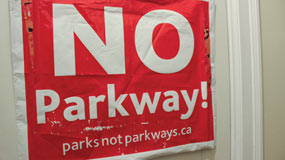

The Parkway is a divisive issue in Peterborough and draws on a long history of controversy. This long history can make it seem like the Parkway has been debated for nigh on 70 years but really, the issue has only surfaced in the last fifteen years when the City proposed a major thoroughfare for the North end using the route planned in 1947.
The Parkway first appeared in 1947 as part of the City’s Official Plan, which laid out an integrated strategy for Peterborough’s growth. The Parkway was part of a larger plan to construct a ring road around the city. This section was intended to connect the North and South sides of the city while bypassing much of the West-end. During the 1950’s, the city bought the requisite land and designated it for the Parkway Corridor but did not move forward with construction.
The Parkway discussion was ongoing, but meaningfully resurfaced in 2002 in the City’s Transportation Master Plan. It planned on commencing construction on the land purchased for the Parkway. In 2003, City Hall held a referendum to assess whether or not this development was supported by citizens.
At this time Peterborough voted against development of a ‘partial Parkway’. However, this referendum failed to meet a minimum turn out of 50% of eligible voters and the resulting decision was not binding. Council agreed to not carry out Parkway construction at that time but left it in the Transportation Master Plan.
In 2011, issues of access to the Peterborough Regional Health Centre brought the Parkway back into the discussion at City Hall. A Comprehensive Transportation Plan that included the Parkway was completed and approved by City Council.
This year, the Capital Budget for the City of Peterborough included $2.25 million allocated for the creation of detailed plans of the first phase of the Parkway.
Many citizens and civil society groups have repeatedly spoken out against the development of the Parkway. They reference reasons like the preservation of greenspace, watershed ecosystem management, inappropriate use of tax dollars, and that it will be ineffective at solving transportation problems.
Key among these groups is Parks Not Parkways, who had a representative speak to Arthur about the issue. “We don’t think that the Parkway will do what they say it will do,” he said.
Moreover, this representative purchased his home in the North end under the assumption that the greenspace and trails would be preserved and, as he put it, “under the assumption that a public vote means something.” With the construction of the Parkway, he is now considering moving away.
Other critiques of the Parkway question whether or not it is necessary for our contemporary city. Considering that Peterborough has not developed in the same way that was planned in 1947, the Parkway need not be an integral component of city planning today. They argue that there is greater value in having urban greenspace than in a new thoroughfare. Looking at the classic example of Central Park in New York City, that park fulfills a function in the metropolis that would be impossible to replicate if greenspace was not preserved from an earlier time.
Parks Not Parkways and other advocates have suggested numerous alternatives to the Parkway Corridor. The most strongly advocated plan involves increasing the capacity of a few key roads in the area without building any new thoroughfare. This would leave the greenspace and Jackson Park intact while mitigating the traffic problems that are being used to justify the Parkway.
Other advocates for alternatives are focusing on developments through Jackson Park. Plans are debating whether or not the Parkway would should be built through the park or if a bridge should be built over it. Yet, this is a much smaller debate in the question of whether or not the road should be built at all.
The larger debate about whether the Parkway is necessary can be stifled in debates about the specifics. The Parks Not Parkways representative said, “The [Environmental Assessment] process is designed to guarantee that engineering projects go ahead. It really doesn’t evaluate if a project is a good one, it just says what the best way to do it is.”
The issue stems from the recurring need for a comprehensive transportation strategy in the city. While this specific thoroughfare has been in the plan for decades, the effects will be immediate and will reach long into the future. The civic engagement and the debates that the Parkway has sparked over the past 15 years go to show how this issue is important to citizens’ interests and will continue to be an issue.

